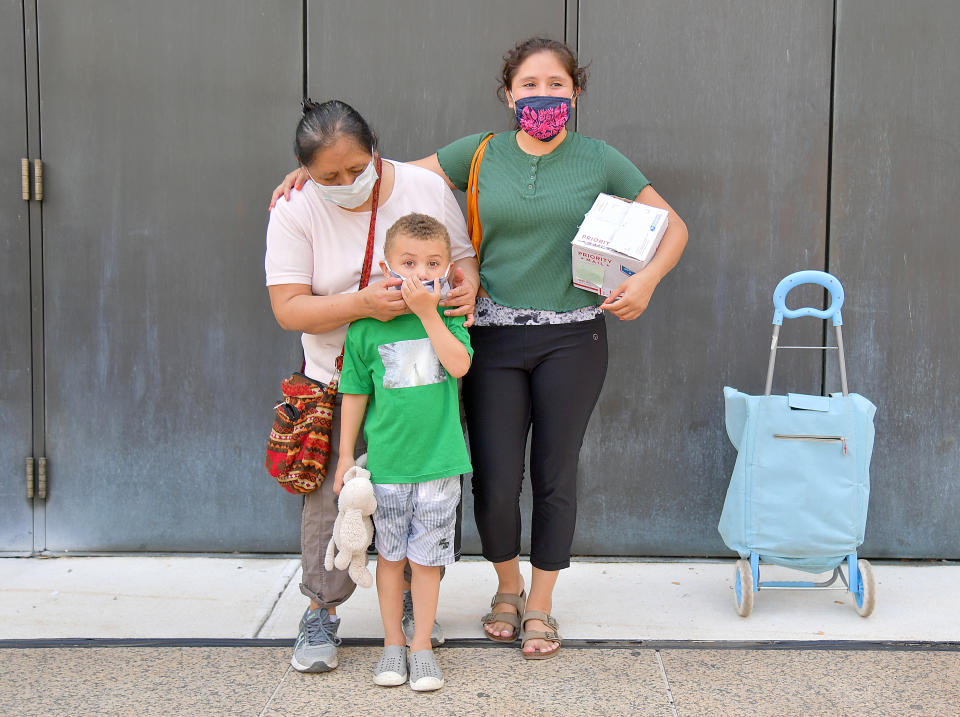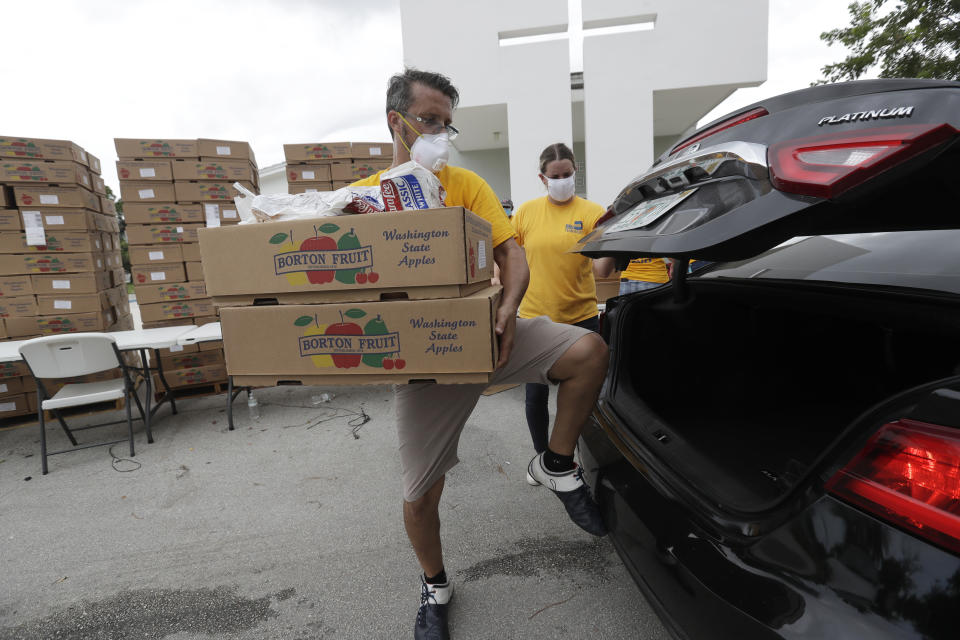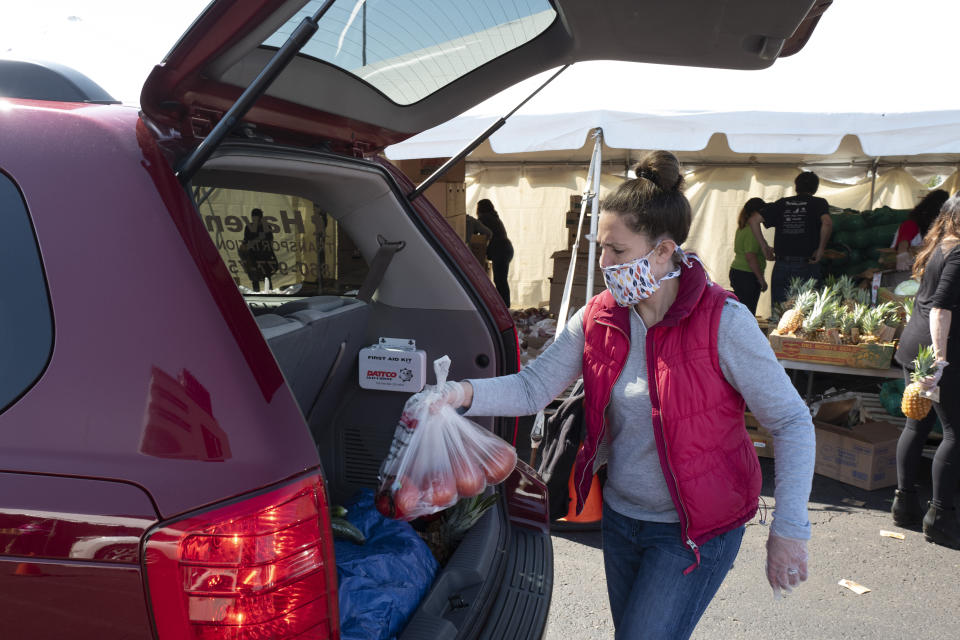'A perfect storm:’ More Americans could go hungry if key government aid expires
At the height of the pandemic, jobless Americans thronged food banks and swamped food stamp registries as they struggled to feed their families. Those scenes are poised to repeat this summer if the federal government allows a key support to expire this week.
Already, the percentage of Americans experiencing food scarcity is at its highest point since tracking began at the end of April, rising to 12.1 % in the third week of July from 10.8% the previous week, according to the latest Census Household Pulse Survey released Wednesday.
But it’s the impending expiration of the extra $600-a-week in unemployment insurance on Friday that worries those tasked with keeping Americans from going hungry — on top of the pause on some state re-openings that includes the future of schools.
“It's a perfect storm coming through with increased closures and a reduction in benefits,” said Sari Vatske, executive vice president at Feeding South Florida, which operates a food bank in a state that is seeing a huge increase in COVID-19 cases as well. “It’s really impacting the hospitality and tourism and retail industry down here. So we’re hit particularly hard.”
$600 ‘associated with large reductions in food insecurity’
Under the CARES Act passed in March, out-of-work Americans received an extra $600 per week in jobless benefits on top of what they received in unemployment from their state. The aid, which replaced more than some low earners’ typical income, is set to expire on July 31.
Read more: Coronavirus: How to apply for food stamps
After that, many Americans will see a greatly reduced unemployment checks, with the median cut of 52% to 72%, according one analysis, unless Congress can come to a deal, which appears unlikely.

While food insecurity increased even though workers received that extra $600, the additional benefits prevented worse outcomes, according to new academic study that followed 8,500 people from April to July.
Getting the additional benefits was associated with a 30% reduction in food insecurity and a 42% reduction in eating less, the study found.
“We conclude that unemployment insurance benefits during the period when the $600/week federal supplement was in place was associated with large reductions in food insecurity,” the study authors wrote.
‘That will lead to increased demand and food assistance’
Food banks are now bracing for another onslaught of clients as states like California, Florida, and Texas, are reinstating prematurely lifted measures as the virus spreads and the extra jobless benefits expire.
“If the benefits are not extended in some fashion,” said Michael Flood, president of the Los Angeles Regional Food Bank, “then I would certainly guess that will lead to increased demand and food assistance.”

Feeding South Florida has seen an uptick in need in the past two weeks. The food bank has already served 1.2 million this year, up from 700,000 individuals a year in normal times.
Read more: What to do before you lose your job
“People are relying on our system, even a little bit more than the elevated need we were already seeing,” Vatske said.
Since Houston’s outbreak began in June, the food bank there experienced a 171% increase in clients, according to president Brian Greene. He expects that volume to remain constant through 2021.
“The level of demand we're seeing now is roughly what we'll be seeing through the end of the calendar year is what we're projecting,” Greene said.
‘All the trends we're talking about are really negative’

Another potential food problem on the horizon is the uncertainty of school reopening in August and September. If schools return to an online or hybrid format of in-person and online education, that means parents will have to provide several weekday meals that otherwise would be provided by schools.
While school districts used creative solutions in the spring to meet needy populations — such as grab-and-go distributions — that doesn’t have the same impact as feeding children in school.
Read more: Everything you need to know about the extra $600 in unemployment benefits
“People don’t always have access to transportation,” Vatske said. “Maybe parents who are working are also homebound. They’re not able to drive their kids to these sites.”
It’s a problem California will face again. Los Angeles County and most of California recently decided to transition to remote learning for the 2020-2021 school year, meaning that millions of students will go without a school breakfast, lunch, and — in some instances — an after-school snack or meal kit to take home.
“All the trends we're talking about are really negative,” Flood said, “and that's why from our standpoint, we really urge Congress and the administration to get another relief bill passed and signed into law.”
Stephanie is a reporter for Yahoo Money and Cashay, a new personal finance website. Follow her on Twitter @SJAsymkos.
Read more:
Coronavirus puppy scams 'seemed legit,' ensnared dog lovers amid pandemic: Illegal Tender podcast
Only 13 states escape New York, New Jersey, and Connecticut's coronavirus travel restrictions
Illegal Tender podcast: How 'MLM' schemes turn regular lives upside down
Follow Yahoo Finance on Twitter, Facebook, Instagram, Flipboard, SmartNews, LinkedIn, YouTube, and reddit.

 money
money 

